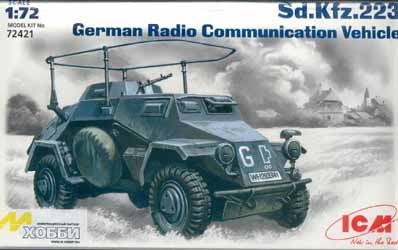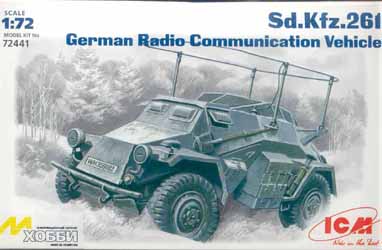Vehicle
Description and History For the Modeler
Before I get on this review, I give great thanks to ICM for releasing
these interesting models that I expected I would only see perhaps
in resin. In the above very nice box art we see the Sd.Kfz.223 armored
car armed with a single machine gun and in early WW2 dark gray color.
Though having the turret of the Sd.Kfz.221 armored car, the Sd.Kfz.223
leichter Panzerspähwagen (and the Sd.Kfz.260 and 261) was based
on the chassis and body of the Sd.Kfz.222 armored car. We cannot make
an Sd.Kfz.221 just by removing the 223’s frame antenna.
If modeling an interior then be aware that the 221 and 223 did not
have a typical turret on a ball bearing race, but was supported by
a pedestal mounted on the vehicle floor. The 223 carried a crew of
3, a frame antenna, and a FuG10 radio for long-range communication
with armored car and panzer units.
The box art of the Sd.Kfz.261 shows the vehicle in dark gray and the
frame antenna extended. The 260 and 261 were externally very similar
so a review of the 261 would also cover the Sd.Kfz.260. The 260 had
a rod antenna for a FuG7 radio for communicating with aircraft, while
the 261 had a large frame antenna for a FuG12 radio for communicating
with different army headquarters. The Sd.Kfz.260 and 261 carried no
armament except for machine pistols, had a crew of 4 and had no turret.
The 222, 223, 260 and the 261 were all released in two versions: the
Ausführung A (or Ausf.A) and the Ausf.B but I’ve found
no clear explanation of the difference. I surmise the difference between
the Ausf. A and Ausf. B were a change in the visors to those similar
to the Sd.Kfz.251 halftrack, a more powerful engine and change from
an MG13 machine gun to an MG34 for the 222 and 223. (Ed. Note:
for more information: check the article about the the evolution
of the Sd.Kfz.222.) Based on the visors I believe that ICM’s
Sd.Kfz.222, 223, 260 and 261 are all late, Ausf.B versions. Produced
from 1936 to 1944 and used to the war’s end, these vehicles
can be modeled in either dark gray or panzer yellow with camouflage
patterns.
The
kits
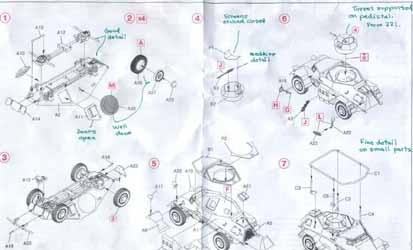
ICM’s Sd.Kfz.223 leichter Panzerspähwagen
(Fu) model contains 57 injection molded polystyrene plastic parts
and two etched brass parts. The kit instructions are clear and are
broken down into seven steps and substeps A though L. The side doors
are molded separate so we can model them open but, alas, there is
no interior detail. Assembly has the frame antenna extended up so
there will need to be some surgery on the support frames to lay the
antenna down.

Here is part of the kit instructions
for ICM’s Sd.Kfz.261; we can see the only difference from the
Sd.Kfz.260 is the change from a frame antenna to a rod antenna, no
turret and a different screen over the crew compartment. The chassis
and hull assemble the same as in the Sd.Kfz.223 instructions above.
No interior parts are included.
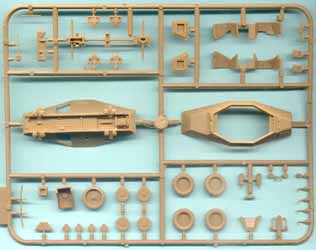
This sprue A is common to all the ICM leichter Panzerspähwagen
kits: the Sd.Kfz.222, 223, 260 and 261. Molding is crisp, detail appears
good and reasonably accurate. The ICM suspension and detail is superior
to that of Airfix’s veteran Sd.Kfz.222 kit (a kit now mistakenly
sold as 1/72).
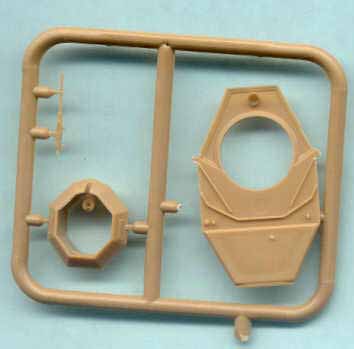 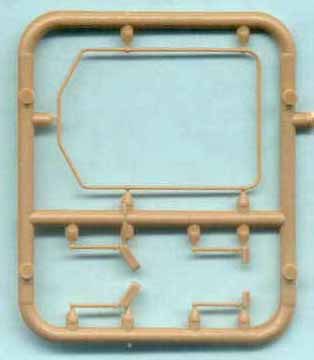 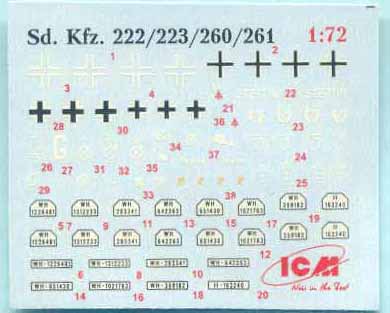
At the left is sprue B for ICM’s Sd.Kfz.223 armored car with
the vehicle roof, the MG 34 machine gun and turret. Interior parts
for the turret visors may be scratchbuilt. The rear of the car roof
was actually open with a mesh screen though ICM molded it filled in,
blanked off under their etched brass screen. In the middle is sprue
C with the frame antenna, a sprue common to both the 223 and 261 kits.
At the right is the water slide decal sheet of markings common to
all four of the ICM leichter Panzerspähwagen kits.
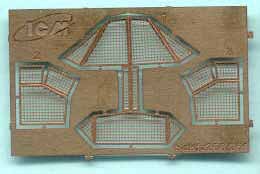 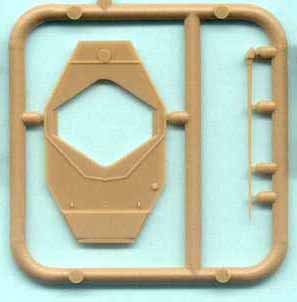 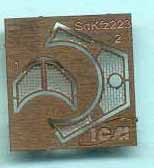
The etched brass fret at far left is
the screen for the open compartment of the Sd.Kfz.260 and 261 cars.
The etching looks well done. In the center is the roof of the Sd.Kfz.260
and 261 (with the rod antenna used only with the Sd.Kfz.260). German
antennas were hollow copper rods and should not be modeled like Allied
flexible whip antennas.
I hope ICM makes the small changes needed to the hull and releases
a Sd.Kfz.221 armored car kit in 1/72 scale next.
Disclaimer:
This model was purchased through a local hobby shop and I have
no connection with ICM or any model distributor.
|

